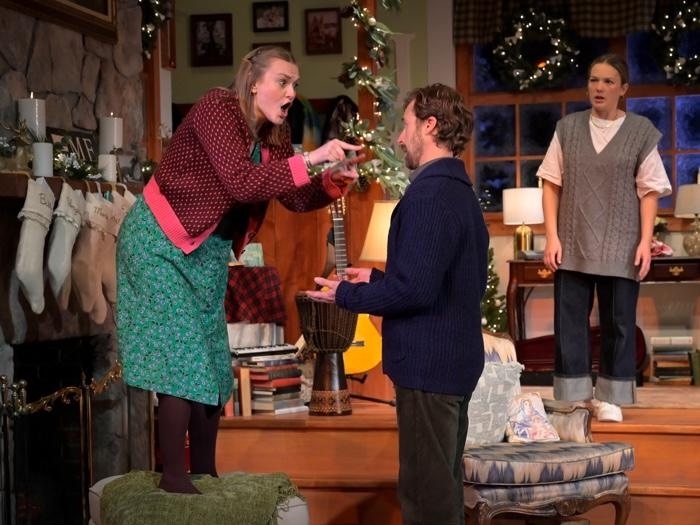
There’s lots of beautiful music in “Cult of Love,” the coruscatingly funny drama now on stage at the Berkeley Rep. Alas, every song is a cover tune.
The Dahl clan — elderly parents, four adult children and their partners — has gathered at the old suburban homestead on Christmas Eve. Accompanying themselves on piano, guitar, fiddle and, at one point, a pathetically comical melodica, they sing psalms and carols and Christian folk tunes, as if fleeting moments of vocal harmony might somehow cover up their family’s fundamental fractiousness.
They lift their voices in song, vainly hoping to avoid raising them in anger. And their failure is the audience’s reward.
The counterpoint of sweet singing and bitter recrimination sharpens up the old saw of the family gathering-cum-meltdown. And playwright Leslye Headland‘s sublimely serrated dialogue makes the most of the genre’s more predictable elements.
Yes, there’s a drug addicted prodigal son in the valley of these Dahls, and a gay sibling, too. The clashes between conservative Christianity and left-leaning atheism are hardly unexpected, nor is the simultaneous deep denial and looming omnipresence of mental illness. Sibling rivalry, parental favoritism, and hidden marital strife are all in the mix.
There’s an undeniable affection for old-fashioned kitchen sink drama here, but Headland and director Trip Cullman have polished it all to such a winking gleam that the production manages to tiptoe a fine line between homage and parody. Everything simultaneously tickles and stings. Imagine Eugene O’Neill and “Mama’s Family” in perfect equipoise.
Scenic designer Arnulfo Maldonado‘s nutcracker-crowded, garland-strangled, split-level set is as utterly believable and as painfully ridiculous as the characters it teems with.
Cullman has choreographed every crowded moment with immaculate precision, his cast of 10 moving and speaking with an interlocked, fine-grained realism.
Each member of the extended family feels specific and distinct, even as they coalesce into a single, indivisibly dysfunctional whole.
And still, when the Dahls sing together, you sense an inexplicable reservoir of compassion, deep beneath the chaos. A living family portrait with an uncanny high-def sheen, this is an ensemble performance not to be missed.
